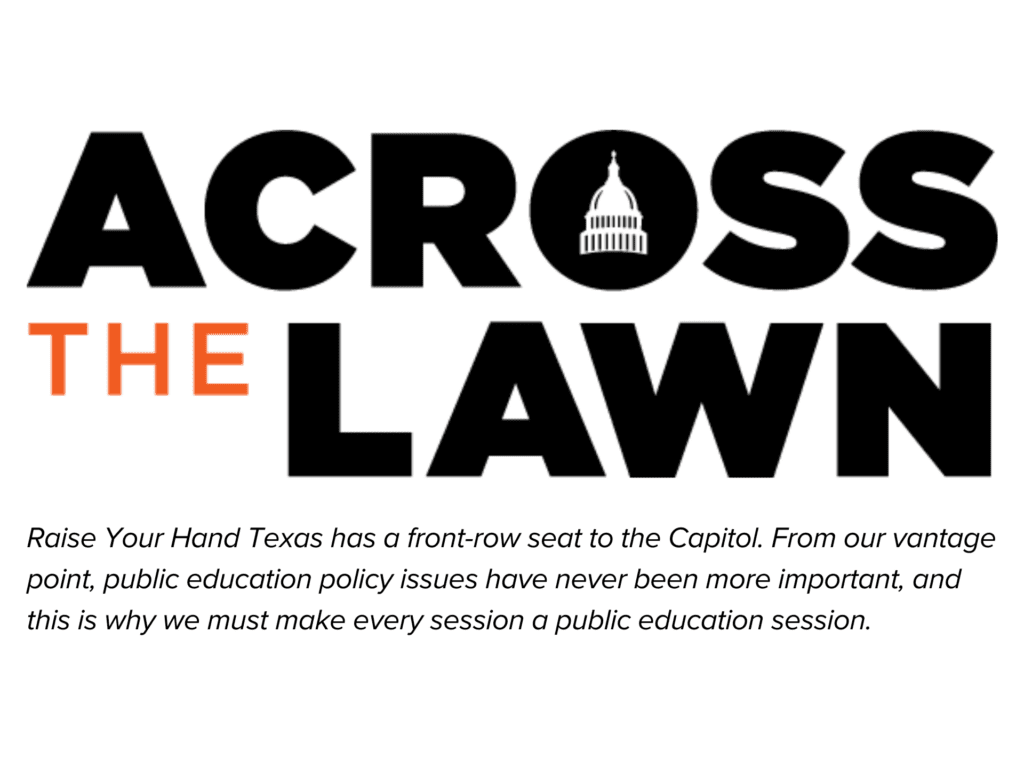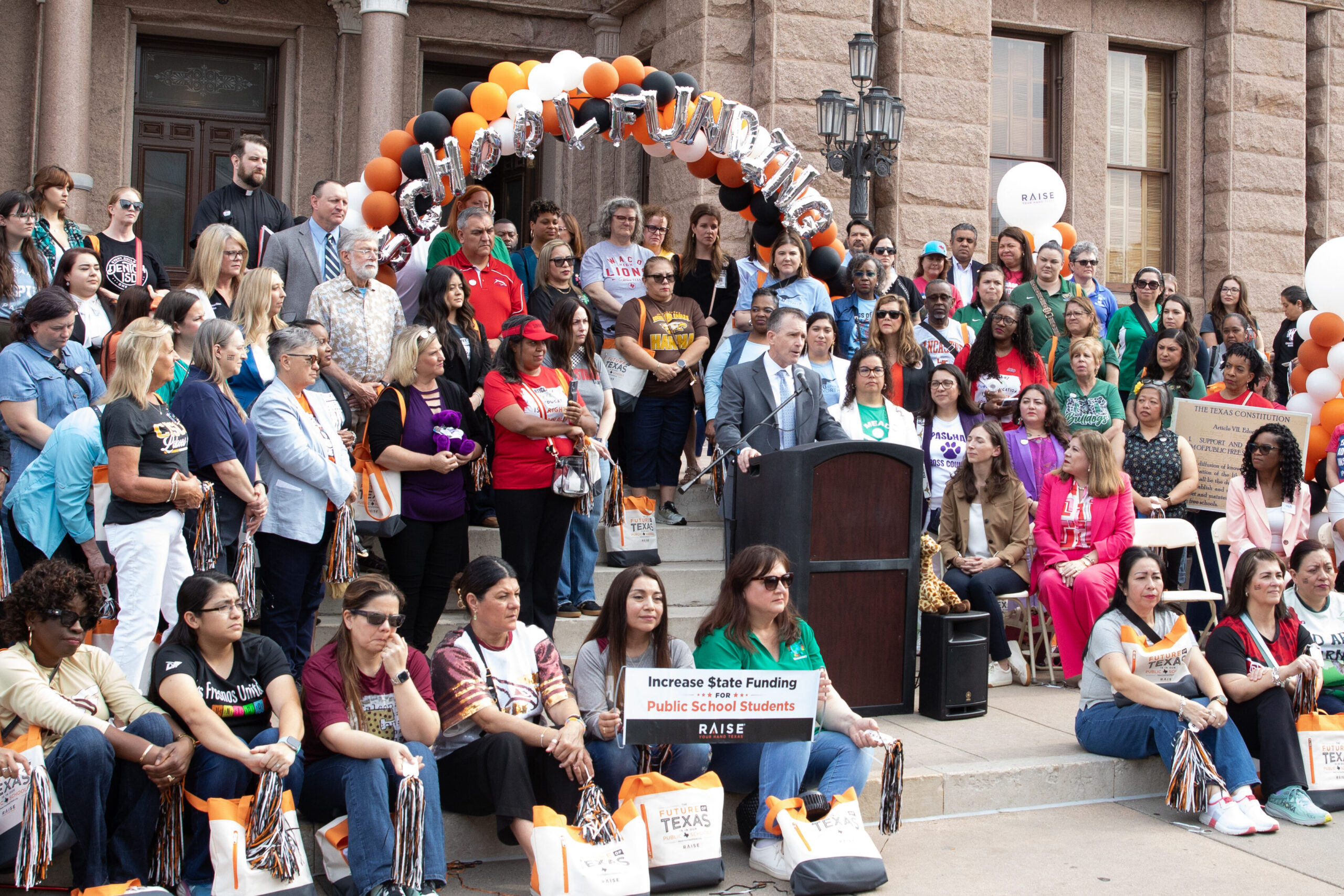
categories
Across the Lawn – June 21, 2024

June 21, 2024

One Thing to Do: Watch Our Video Series on School Funding
Watch our three-part video series on public school funding in Texas. Share your favorite video from the playlist on social media with hashtags #FundOurSchools, #TxEd, and #TxLege.
Watch Videos on School FundingFive Things to Know:
1. School Districts Across Texas are Bracing for Substantial Budget Cuts
Several school districts in urban, suburban, and rural areas of the state are preparing to adopt reduced budgets at the end of June. Many school leaders cite a combination of factors influencing their decisions to shrink expenses, including state inaction during the 88th legislative session, federal relief funds running out, double-digit inflation, and student enrollment declines. Consequently, school districts are closing schools, cutting programs, and laying off staff. Last session, the Texas Legislature earmarked $4 billion for public schools after accumulating a record $30 billion surplus. However, the directives for those funds were tied to legislation that would have created a universal voucher program, and it failed to pass.
Texas continues to rank in the bottom 10 states for per-pupil spending on public education, lagging the national average by over $4,000 per pupil. The most recent reporting suggests compensation for Texas teachers lags behind the national average by more than $13,000. Roughly 80% of school district budgets are allocated for compensating educators and other staff. The Texas Legislature has not increased the basic allotment since 2019, and at the same time, inflation has grown by 22%.
2. TEA Releases Spring 2024 STAAR Test Results
The Texas Education Agency (TEA) released Spring 2024 STAAR test results for students in Grades 3-8. The results include assessments in mathematics and reading-language arts in grades 3-8, 5th and 8th-grade science, and 8th-grade social studies. According to TEA, this year’s results show that reading-language arts proficiency for students varied across grades. While some grades demonstrated improvement, others saw slight declines. The results show declining mathematics and science performance across all tested grade levels.
The results were published against the backdrop of a STAAR test redesign and the use of automated scoring engines, raising concern and skepticism over the effects on student performance.
3. Texas Education Agency Unveils Open Education Resource (OER) Textbooks
TEA has launched two state-owned OER textbooks as part of their directive from HB 1605. The textbooks cover K-5 reading-language arts and K-8 algebra and mathematics, respectively. The State Board of Education must approve the instructional materials before they can be offered to public schools. The public comment period has already started and will end on Friday, August 16. Public hearings will be held June 25-28 and September 10-13, with the final vote taking place this November.
If the OER textbooks are approved, school districts that adopt them will receive $40 per student on top of what they already receive from the Instructional Materials and Technology Allotment, in addition to an allotment of up to $20 per student to cover printing costs in addition to an additional allotment of up to $20 per student to cover printing costs.
Governor Abbott, along with House and Senate Education Chairs Brad Buckley and Brandon Creighton, issued statements in support of HB 1605 shortly after the OER textbooks were announced.
4. House Speaker Dade Phelan and Lieutenant Governor Dan Patrick Issue House and Senate Interim Charges
The Texas House and Senate have officially received their interim charges and committee hearings are underway. For the Texas House, interim charges related to public education include:
- Monitoring the implementation of legislation from the 88th Legislative session, including HB 1605 which requires TEA to create SBOE-approved instructional materials.
- Evaluating the use of education savings accounts in other states and making recommendations for a Texas program.
- Examining the impact of uncertified teachers and making recommendations to increase certification opportunities.
- Evaluating opportunities to improve literacy and numeracy outcomes in pre-K through 3rd grade.
For the Texas Senate, interim charges related to public education include:
- Making recommendations to improve literacy and numeracy outcomes in pre-K through 5th grade.
- Reviewing the roll-out and impact of the STAAR redesign and the Texas Through-year Assessment Pilot (TTAP).
- Examining how school districts spent COVID-related federal relief funds and subsequent student outcomes.
- Monitoring the implementation of legislation from the 88th Legislative Session relating to school safety, library procurement, and high-quality instructional materials.
5. NIEER Issues their State of Preschools 2023 Yearbook
The National Institute for Early Education Research released its annual findings on preschool quality, which includes individual state profiles with key data points related to preschool funding and quality. According to the report, Texas spends $4,235 per pre-K student. This is $1,500 less than what the state spent in 2002, even when accounting for additional COVID-19 relief funds, and is still $3,000 below the national average.
When it comes to quality preschool, Texas policies only meet four of the 10 benchmarks of high-quality pre-K, making it one of only eight states in the country to attain fewer than five of these important benchmarks. Texas’ missing benchmarks include class size limits, teacher-student ratios, and a quality improvement system.



